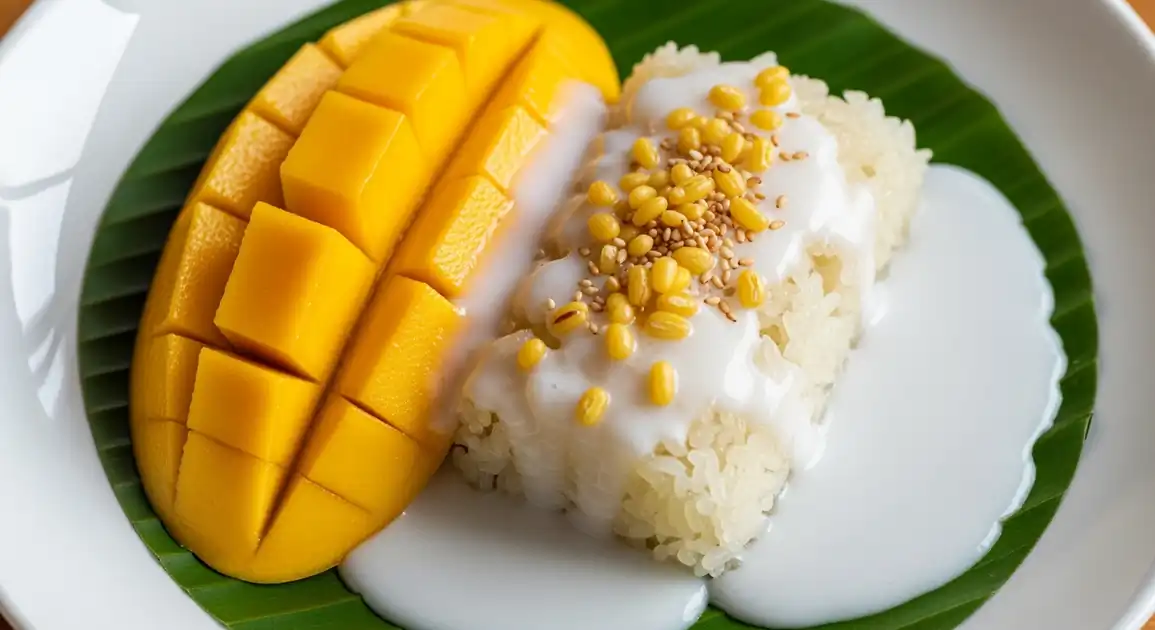Mango Sticky Rice
ข้าวเหนียวมะม่วง (Khao Niao Mamuang)

Description
Bangkok offers an overwhelming variety of Mango Sticky Rice, from humble street carts to legendary specialty shops and high-end restaurants. Competition ensures quality, but it pays to know where to look for the best.
Dietary Information
Serving information
Serving style
Served on plates in restaurants, often in clear plastic or styrofoam boxes for takeaway from stalls and shops. Usually comes with a small packet/container of coconut cream and toasted seeds/beans.
Quick facts
Specialty Shops: Often 9 AM - 8 PM or similar. Street Vendors: Variable, common from 11 AM - 10 PM. Night Markets: 5 PM - 12 AM.
Safety Tips
What to Look For
-
Ripe, freshly cut mango
Mango should be vibrant yellow/gold, sweet-smelling, and cut upon order or look recently prepared. Avoid brown, mushy, or sour-smelling mango.
-
Fresh-looking sticky rice
Rice should be moist, glossy, and soft. Avoid rice that looks dry, hard, discolored, or has been sitting out uncovered for long periods.
-
Fresh coconut milk/cream
Coconut milk spoils quickly in heat. Look for white, creamy sauce. Avoid anything yellowish, separated, bubbly, or smelling sour, which indicates spoilage.
-
Vendor assembles the dish to order
Ensures maximum freshness, especially for the mango and coconut cream topping. Pre-assembled boxes sitting in the sun are riskier.
-
Clean preparation area and utensils
Look for clean cutting boards, knives, spoons, and containers. Observe hygienic handling practices.
-
Busy stall with high turnover
Indicates that ingredients are likely replenished frequently and haven't been sitting around for too long.
What to avoid
-
Mangoes that look bruised, overly soft, or brownish
These are signs of overripeness or spoilage.
-
Coconut cream that smells sour or looks separated/yellow
Spoiled coconut milk can cause food poisoning. Trust your nose.
-
Pre-packaged portions left sitting in direct sunlight or heat
Heat accelerates spoilage, especially of the coconut milk and mango.
-
Sticky rice that appears dry, hard, or discolored
Indicates it's not fresh or properly prepared.
-
Visible flies or pests around the food display
A clear sign of poor hygiene.
-
Unclean vendor practices (e.g., handling money then food without cleaning hands)
Increases risk of cross-contamination.
Price information
Price range
Budget tips
- Street vendors in non-tourist areas offer lower prices (60-100 THB).
- Famous shops like Mae Varee in Thonglor are pricier but known for quality (150-200+ THB).
- Food courts in malls can offer mid-range options.
- Check prices before ordering, especially in high-traffic tourist spots.
Value indicators
- Use of premium 'Nam Dok Mai' mangoes, perfectly ripe.
- High-quality, fragrant sticky rice.
- Fresh, well-balanced coconut cream.
- Clean presentation.
- Reputation of the vendor/shop (e.g., Mae Varee, Kor Panich).
Where to Find This Dish
Thonglor (Sukhumvit 55)
Famous for high-quality Mango Sticky Rice, particularly Mae Varee.
Mae Varee shop, Thong Lo BTS station
Daytime, Evening (shop hours)
Yaowarat (Chinatown)
Numerous street food stalls offer it, especially during evenings.
Yaowarat Road main strip
Evening (6 PM onwards)
Or Tor Kor Market
High-end fresh market with vendors selling premium quality fruits and desserts, including Mango Sticky Rice.
Opposite Chatuchak Weekend Market, Kamphaeng Phet MRT station
Daytime (market hours)
Sao Ching Cha (Giant Swing area)
Home to old, respected shops like Kor Panich known for traditional recipes.
Giant Swing, Bangkok City Hall
Daytime (shop hours)
Vendor Tips
- Famous shops often pre-package rice and mango separately for freshness.
- During peak season, look for vendors specifying 'Nam Dok Mai' or 'Ok Rong' mangoes.
- Don't be afraid to ask 'Mamuang waan mai?' (Is the mango sweet?).
- Street vendors near office buildings during lunchtime can be a good, quick option.
How to Order
Regional Variations
-
Mae Varee Style
(ข้าวเหนียวมะม่วง แม่วารี)
Known for high-quality Nam Dok Mai mangoes, perfectly cooked rice, and separate packets of coconut cream and crispy beans. Often includes three colors of sticky rice (white, green pandan, black).
-
Kor Panich Style
(ข้าวเหนียวมูน ก.พานิช)
A historic shop famous for its 'Khao Niao Moon' (coconut-infused sticky rice), known for its specific texture and flavor profile, often considered more traditional.
-
Food Court Versions
(ข้าวเหนียวมะม่วง ฟู้ดคอร์ท)
Often standardized portions available in mall food courts, providing convenience and air-conditioned comfort.
Cultural context
History
Mango Sticky Rice is a traditional Thai dessert with roots possibly dating back to the late Ayutthaya period or early Rattanakosin period. It showcases key Thai ingredients: rice, coconut, and seasonal fruit. It gained immense popularity both domestically and internationally, becoming synonymous with Thai cuisine, especially enjoyed during the hot summer mango season.
Local significance
A beloved dessert icon in Bangkok, representing both traditional flavors and the city's high standards for quality street food and desserts.
Eating customs
- Consumed as dessert or a substantial snack.
- Often shared among friends or family.
- Enjoying it at a famous stall is part of the Bangkok food experience for many.